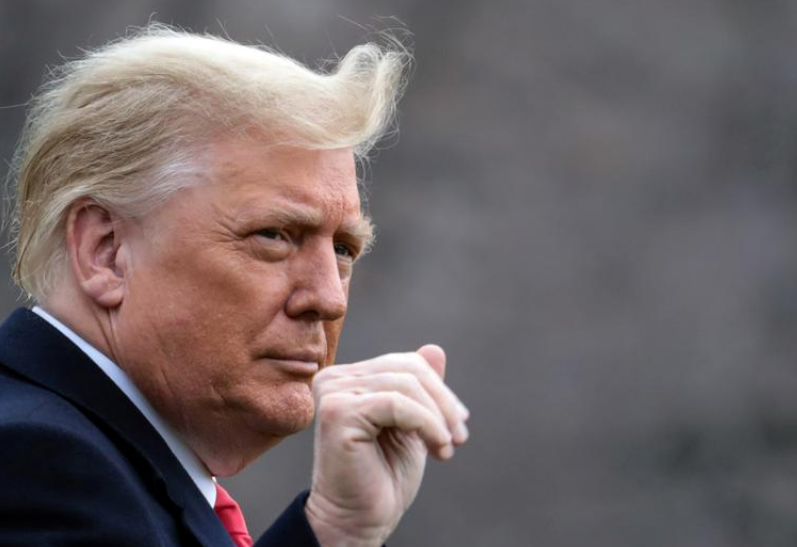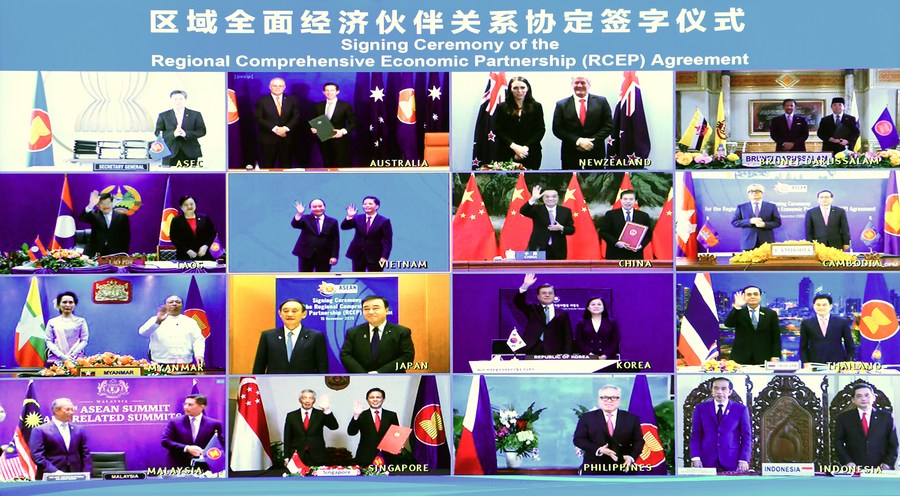
Editor's note: Millions of lives took a dramatic turn in 2020. As we move into a new year, it's time to look back at the most startling events over the past 12 months in China and beyond. The second piece in our year-end series focuses on China-U.S. ties. James Rae is a professor at California State University Sacramento. He was also a Fulbright Scholar at Beijing Foreign Studies University from 2017 to 2018. The article reflects the author's opinions, and not necessarily the views of CGTN.
The year 2020 will not be soon forgotten, and the chaotic effects of the coronavirus destabilized many sectors of life will certainly contribute to the downward spiral in China-U.S. relations. Is there any reason for optimism in 2021 with a change of leadership in Washington, D.C.? Could conditions actually worsen? The bilateral relationship is probably more unfavorable than at any time since opening and normalization in the 1970s, and the forecast remains rather gloomy despite the opportunity for a reset.
Below are speculations about future ties across four dimensions: security, economy, governance, and society. Some aspects will likely track the status quo, but specific areas should see improvement though conditions may worsen in others. Let's look at some of the major issues one by one.
In the security realm, we can expect little dramatic change. The ongoing systemic transformations that portend a narrowing of relative power capabilities between the two will continue as China's military strengthening sets off alarm bells in American defense planning. Ironically, for all of his tough talk and appreciation for strong men, President Trump found little concrete interest in military affairs, and much of his posturing was mere bluster.
Tensions over cyber-security will remain, and deployments of theatre missile defense may resurface. Indeed, conditions are more likely to be jeopardized by some form of a broad Obama-era rebalancing to the reconstituted 'Indo-Pacific' and more assertive American efforts to interfere in the South China Sea. Yet, reasons for optimism remain.
The U.S. is likely to recommit to multilateral efforts at promoting counter-terrorism and nuclear non-proliferation generally, and specifically to the Joint Comprehensive Plan of Action on the Iran nuclear question and more traditional diplomacy through the Six-Party talks on the DPRK's nuclear and ballistic missile programs. Those areas of agreement could be a salve to reduce mistrust on the broader security front. Finally, cross-strait relations should at least return to some form of mutually acceptable dialogue as the ideologically-driven, and hyper-partisan pro-Taiwan angle of Secretary of State Pompeo is likely to be squared.

U.S. President Donald Trump departs on travel to West Point, New York from the South Lawn at the White House in Washington, U.S., December 12, 2020. /Reuters
U.S. President Donald Trump departs on travel to West Point, New York from the South Lawn at the White House in Washington, U.S., December 12, 2020. /Reuters
The most likely opportunity for improvement is within the economic dimension, where President Trump has torpedoed the relationship during the past year. For the past three decades, economic interdependence has provided the ties that bind, and the fraying of the fabric is of the highest concern. The collapse of the working relationship in business and economics is all the more alarming since in the security dimension, mutual competition is largely assumed, and the extant cultural divisions within the two societies and governments deepen misunderstandings.
From tariffs to banning Chinese app-based platforms, network systems, and investments, and even a congressional statute to delist Chinese private firms from American stock exchanges, across the board the Trump administration launched a war against the Chinese economy, even calling for an end to the very economic model that lifted hundreds of millions of Chinese out of poverty and into the middle class. For one, the Biden administration is likely to phase out the harsh tariffs on China over time, and with the RMB rising this year, the currency issue may be less salient.
On the question of blocking Chinese companies' access to American investment opportunities and capital markets, perhaps little improvement may be expected as a bipartisan consensus appears to be emerging in Washington that the U.S. is not able to compete with China and thus the American side is taking radical steps to delegitimize China's leading firms and deleverage their global influence.
Those conditions bring us to another area that could break either way, the global governance dimension. The U.S. will return to multilateral efforts to combat climate change by rejoining the Paris Accord, resume membership in the World Health Organization (WHO), recommit to the World Trade Organization (WTO), along with sundry other UN agencies and international organizations.
The American presence will support numerous areas of collective concern between the two countries, and among the rest of the world too, and will only help improve bilateral cooperation. However, since the U.S. stepped away from multilateral institutions the past four years, China's regional multilateral efforts have continued apace, witnessing only growth and expansion in the Belt and Road initiative, the Asian Infrastructure Investment Bank (AIIB), the Shanghai Cooperation Organization (SCO), and most recently the Regional Comprehensive Economic Partnership (RCEP), among others.
These win-win collaborations only strengthen China's diplomatic position among developing and developed countries. The Biden administration may attempt to resuscitate American-led regionalism, like the failed Trans-Pacific Partnership (TPP, now repackaged as the CPTPP, without the U.S. but more amenable to China) or Biden's questionable call for a 'Summit for Democracy.' With a heavily Europhile administration, the U.S. may try to pry Europe away from China and launch a diplomatic push against China beyond what Trump could muster with his illiberal outlook and antagonistic approach to historical American allies. Ideologically animosity in the West over China's domestic stance on Hong Kong and other sovereignty issues may poison future dialogue, and the risk of collapsing communications is probably just as great as before.

Leaders of the 15 participating countries of the RCEP agreement attend the trade pact's signing ceremony, held via video link, November 15, 2020. /Xinhua
Leaders of the 15 participating countries of the RCEP agreement attend the trade pact's signing ceremony, held via video link, November 15, 2020. /Xinhua
Nevertheless, interactions between the two governments should improve, beginning at the top. The Biden team is much more nuanced, sophisticated, and professional than the outgoing Trump-Pompeo crew. Consistency in public statements will improve, and dialogue and discussion shall become more routinized while insulting and racially-tinged rhetoric and acrimonious pronouncements should decrease.
Whereas communication collapsed in the past two years as President Trump saw a political opportunity to demonize China during his failed re-election efforts, the Biden administration will take more time to cultivate relationships, including at the head of the state level, while pursuing more commitment to regular exchanges of ideas and positions. With presumed progress from the multitude of vaccines becoming available, people to people exchanges may resume while offering opportunities for students to study abroad once again and tourism to increase with direct flights and the like.
So, what is the sum total? China-U.S. relations will certainly improve from the disastrous 2020 downturn; 2021 shall be more amicable, more pragmatic, and offer more predictable bilateral diplomacy between the two behemoths. Yet longer-term systemic changes are afoot: China is emerging and becoming more confident, while the U.S. is growing more insecure. American prodding on China's core sovereignty issues jeopardizes traditional diplomacy, and patience among China's leadership for being talked down to is wearing thin. But anyone that thought 2020 was an aberration should prepare for more bumps in the road.
(If you want to contribute and have specific expertise, please contact us at opinions@cgtn.com.)

